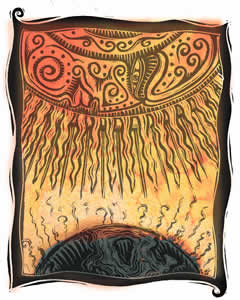 THE UNIVERSITY OF WASHINGTON ALUMNI MAGAZINE
THE UNIVERSITY OF WASHINGTON ALUMNI MAGAZINE
 THE UNIVERSITY OF WASHINGTON ALUMNI MAGAZINE
THE UNIVERSITY OF WASHINGTON ALUMNI MAGAZINE
|
ResearchIt's the End of the World as We Know ItOnly 7.5 billion years from now, a burned-out cinder of a planet called Earth will be engulfed by its sun, a bloated red giant that will melt away any evidence that the planet ever existed. Even worse, the prospects of humans surviving by moving to some other habitable planet or moon aren't good, say UW Professors Donald Brownlee and Peter Ward, authors of a new book, The Life and Death of Planet Earth. Even if such a place were found, getting there would be a huge obstacle.  Science-fiction scenarios depicting probes sent into space are plausible, the two say, and just a few grams of material could carry a DNA sample from every human. But it's not likely the human species itself will survive. Long before Earth's end, life will become quite challenging, and finally impossible, for humans. They predict the end of most plant and animal life in about 500,000 million years. Scorching heat will drive land creatures to the sea for respite. Those that can adapt will survive for a time, but eventually the oceans will warm too much for the complex life forms to continue. About 3.5 billion years from today, the oceans will vaporize in the heat of an expanding sun. "The disappearance of our planet is still 7.5 billion years away, but people really should consider the fate of our world and have a realistic understanding of where we are going," says UW astrophysicist Donald Brownlee. "We live in a fabulous place at a fabulous time. It's a healthy thing for people to realize what a treasure this is in space and time, and fully appreciate and protect their environment as much as possible." "The last life may look much like the first life-a single-celled bacterium, survivor and descendant of all that came before," the authors write. Finally, even the surviving microbes "will be seared out of existence." "It's a healthy thing to think of the place of Earth among the other planets, and its place in the sun. The sun gave life and ultimately it will bring death," Brownlee says.
|